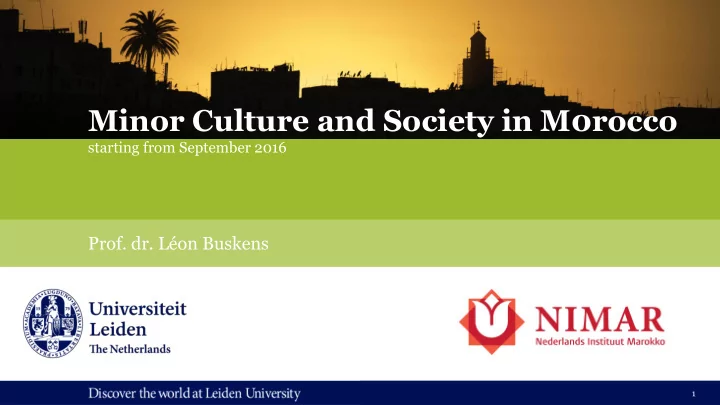

Minor Culture and Society in M0rocco starting from September 2016 Prof. dr. Léon Buskens 1
Minor Culture and Society in Morocco; in brief • A challenging semester in Rabat • A course on social-scientific research of and in Morocco A series of on-site visits • • A course ‘Methods of Qualitative Research’ • A course ‘Research Design’ • Intensive language instruction in Moroccan Arabic, including conversation classes • An independent field research project during the last part of the term The courses are taught by NIMAR faculty and • by guest lecturers from Moroccan institutions. 2
Social-scientific research in Morocco • A series of lectures by scholars based in Morocco • On various aspects of Moroccan culture and society • Such as social movements, gender, migration, urbanisation, relations between town and countryside, media • From different disciplinary angles: sociology, anthropology, history, etc. • Readings offering a good overview of the current state of knowledge • Anchored in the tradition of about a century of modern research on Moroccan culture and society • 5 ec . 3
A series of on-site visits • Excursions to various sites of cultural interest and to social organisations in the surroundings of Rabat and Casablanca • The lay-out of modern Moroccan cities • Finding your way in the inner ‘Islamic’ city • Casablanca and colonial and post-colonial modernity • Fellow students and Moroccan universities • Exploring libraries • Out into the countryside • Museums and the culture of memory • Contemporary art and conspicuous consumption • Social movements and NGOs • Practicing fieldwork in Skoura. 4
5
A course ‘Methods of Qualitative Research’ • An initiation into doing independent ethnographic fieldwork • (Participant) observation • Conversations and interviews • Life histories • Focus groups • Writing ethnographic reports • Weekly assignments • Literature on doing fieldwork in Morocco • 5 ec. 6
A course ‘Research Design’ • Planning your own research project • Formulating a research question • Designing your research: questions and time schedule • The uses of theories and concepts • Paper outline • Fine tuning your project • Relating to existing knowledge • Identifying experts. 7
Intensive language instruction in Moroccan Arabic • Learning to understand and speak Moroccan Arabic • Handbooks available in English/ Dutch/ German/ French • Phonetic transcription • Other languages/ alternatives: Tamazight, Standard Arabic, French, Spanish, English 5 ec. • 8
Your own fieldwork project • Individually or in small groups of two to three persons • Specific well-defined projects • Under supervision of a lecturer • Weekly intervision • Six weeks • An ethnographic report as term paper • A combination of original empirical research, study of existing literature, and theoretical framework • 15 ec. 9
Program overview (provisional) Weeks 1 - 7: Weeks 8- 13: • Social scientific research in Morocco • Fieldwork • Excursions • Weekly reporting and intervison. • Methods and Techniques • Research Design • Moroccan Arabic (or an alternative). December - February EC’s : • Writing your term paper. • Social-scientific research in Morocco, and excursions: 5 EC • Moroccan Arabic: 5 EC • Methods and Techniques, and Research design: 5 EC • Research project and term paper: 15 EC. 10
Studying and living in Rabat Safe studying and living environment • • A pleasant and easy going city with good facilities • Living with Moroccan families or in your own apartment • Contacts with Moroccan and international students • Excellent international connections (airport) Excellent national connections. • 11
Practical information • ‘Culture and Society in Morocco’ will start on 5 September • How to apply: nimar@hum.leidenuniv.nl • Admission: students with a basic knowledge of the Humanities or Social Sciences • What are the costs: participation is free, except for a 100 euro contribution for cultural activities and excursions • Living/housing costs: housing approximately 400 euro/month, living costs approximately 300 euro/month, depending on your spending habits 12
New housing from September 2016! • Excellent classrooms • Facilities for research • Library • Access to Leiden digital collections • Students’ lounge • Easy to reach. 13
Summarizing • Challenging program at NIMAR, the national expertise centre for Moroccan Studies • Learning new skills and languages • A window on North Africa • Initiation into ethnographic fieldwork • Finding your way in a new society • Studying in a safe, pleasant and relaxed environment. 14
*) pictures Mike Spaans & Jan Hoogland See you in Rabat! • Further information? Please contact us nimar@hum.leidenuniv.nl 15
Recommend
More recommend